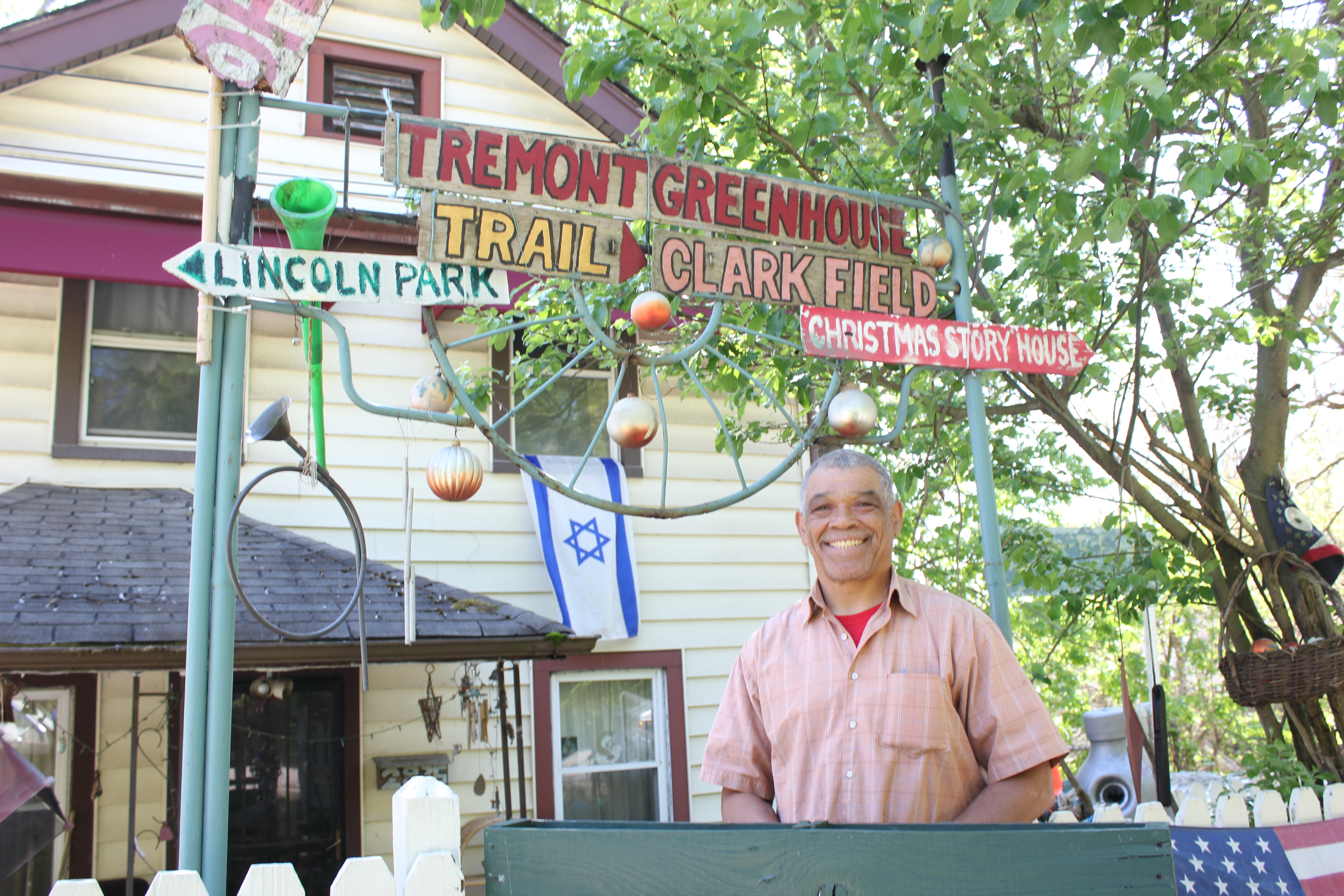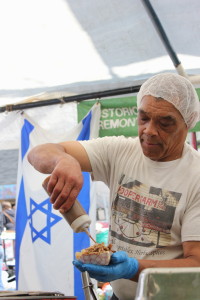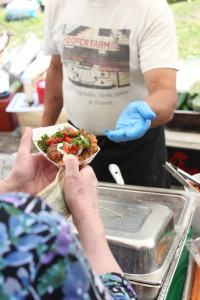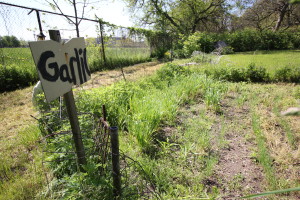Urban farmer Erich Hooper preaches sustainability, responsibility – and in the spirit of tikkun olam, helps others along the way

Hooper stands in front of his Tremont home, the site of Hooper Farms.
Story by Carlo Wolff
Photography by Michael C. Butz

With an Israeli flag hanging at his food tent, Erich Hooper prepares a dish for a customer at the 2016 Hessler Street Fair.
When he was growing up in Tremont, Erich Hooper stayed in the background, learning cooking in the kitchens of neighborhood churches. People didn’t cotton to him being visible, so little Erich stayed in the back of the house. But the boy learned his lessons well and, armed with education in Tremont schools and two years each at Miami University in Oxford and Ohio University in Athens, became a mentor.
A pioneer of urban farming, Hooper has been growing his own and then some for 25 years. He owns Hooper Farm, a home that also serves as a sort of school: Hooper teaches kids from Cleveland schools about the relationship between food and money. He schools them in what in effect is a burgeoning trade: urban farming. And in social skills.
Sustainability is Hooper’s mantra, as is doing good, suggesting he lives according to the notion of tikkun olam (repairing the world). Whether it’s working for the Cleveland House of Corrections in Highland Hills or catering an ethnic club, Hooper is on the beneficial case.
“Farming is a way to bring people together and bring the best out of everyone, a way to level the playing field no matter what your skill level is,” he says during a recent stroll through his backyard, which abuts the Towpath Trail and Clark Fields, in the shadow of factories in the city’s Industrial Valley district. He demonstrates walking sticks his pupils sell for $1 to $25; they’re repurposed branches decorated with bottle caps.
“Here’s something that costs nothing but the time to put it together and you can make some money,” Hooper says, shaking the sticks. Elementary- and secondary-school children gravitate to his “holler” by word of mouth, he says. Schools call him, churches call him, he’s been interviewed countless times. “Everybody else came after me, the first urban farmer in the city of Cleveland who owns their own property,” he says.
Hooper Farm also was the first minority-owned business in Tremont, a Cleveland community by no means immune from prejudice.
Hooper has been preaching the gospel of sustainability and self-sufficiency for a long time, both at home and in the greater community. He’s taken part in the One World Festival, he’s catered Shakespeare at the Zoo, Little Fish Records, Hessler Street Fair. He’s found where he belongs.
As a black Jew – lore and some trinkets in his sister’s possession tell Hooper his family was Jewish on his grandmother’s side – Hooper has been the target of prejudice, largely because of his color. He survived the riots of the late 1960s that tortured Cleveland’s Hough neighborhood, and was stabbed when they spilled over to Tremont.
“I have knife wounds on my body,” says Hooper, a utility athlete in his youth. (He played nose tackle at Miami, weighing 260 pounds at the max; he says the Detroit Tigers drafted him to play catcher when he was in high school.)

Hooper serves one of his sweet potato latkes, topped with a pear-apple reduction, sour cream, roma tomatoes, chives, parsley and Hooper’s signature ghost pepper honey.
“Tremont was more dangerous than Hough; we knew who the enemy was,” he says, recalling the convulsive race riots of 50 years ago. “There were white power buildings on the corners here,” including an Aryan Nation office at West 44th Street and Clark Avenue, and racist groups used to come down to his high school, “put pictures up of monkeys and blacks and a phone number and throw bricks at the school.
“One kid, they ran his testicles into a fire hydrant, another kid had his teeth knocked out, his face going like this,” Hooper says, emitting a sound like a drumstick rattling a washboard. “It was terrible; I’ve been shot at, I’ve been stabbed.”
And, in an incident of high, funny drama, almost shot by Cleveland police.
James Levin, the founder of Cleveland Public Theatre, met Hooper about 30 years ago when Hooper auditioned for a part in Sam Shepard’s “The Unseen Hand.” Hooper got the part of Sycamore, one of three cowboy brothers. One day, Hooper hoisted Sycamore to unusual prominence.
“In those days, we did something called Junkstock, organized by the poet Daniel Thompson,” Levin recalls. “We were doing a rehearsal of this play on a mountain of junk at Pearl Road Auto Wrecking and one of the scenes involved Sycamore pulling a rifle because he’d been threatened by an extraterrestrial.” So Hooper clambered atop a pile of auto parts, brandishing a rifle. Levin figured someone must have called the police “about a black guy with a gun,” and when the boys in blue arrived, “they were ready to take a very aggressive posture,” he says. “I came running down to explain to them we were directing a play, but they refused to believe it; it took a while for me to calm them down.”
Since then, Hooper has catered all of Levin’s festivals, from Ingenuity to One World to FireFish Festival, a gathering set for Lorain Sept. 17. “When I do a festival, he’s the first guy I call,” Levin says. Hooper’s food “is high quality, he focuses on locally produced, which we like to support, and he also works with us in terms of helping staff,” feeding workers in a barter arrangement “during the course of the festival.”
In Hooper’s garden

A sign for garlic stands out in Hooper’s garden
Hooper has planted garlic, tomatoes, beans, grapes, asparagus. He cooks “African traditional dishes” including collard greens and chard. He makes great brisket and sweet potato latkes. His goal is to produce “fresh, local, organic, healthy, innovative food,” he says, noting he likes all foods and cuisines except seafood. In addition to preparing food at Hooper Farm, he cooks in the kitchens of his neighborhood’s few remaining churches, turning out traditional barbecue for the likes of the Italian-American Club in Wickliffe or the American Community Garden Association conference set for August at Cleveland State University.
A fan of classical music and bluegrass, Hooper is similarly eclectic in his spirituality. The exterior of his home bears an Israeli flag with a prominent Star of David. It also sports a sign pointing passersby to the nearby “Christmas Story” house.
Does he identify as Jewish? “Yes, I do, yes, I do,” he says, acknowledging both the Jewish and Christian references. He has some dreidels in his home, and a Chief Wahoo yarmulke, along with several other patches, adorns his denim jacket.
“Why can’t we all get along?” Hooper asks rhetorically, noting he set up his Israeli flag-draped stand next to a Palestinian at a recent One World Festival. Not so rhetorically, he notes the Palestinian moved away.
His aim is to explode stereotypes, helping people along the way. He keeps more than busy with a full-time job delivering for Just Natural Provision, a butcher shop on Woodland Avenue near East 40th Street on Cleveland’s East Side, along with his catering work and Hooper Farm work.
“I’ve had students come from as far away as Connecticut,” says Hooper, claiming that at one point, African-Americans made up 98 percent of the nation’s farmers, but now, only 2 percent – including him.
Hooper Farm certainly keeps Hooper occupied. But it’s not the limit of his vision.
Hooper’s idea is “to level 30 to 60 acres of the city and create a Disneyland-atmosphere farming system,” from farm to table, including a restaurant, even a gift shop, he says. He’d also like to force local groceries to put gardens in their backyards.
In the meantime, Hooper leads a sustainable lifestyle, working hard to get students onto the right track, catering events spanning the alternative and the mainstream, engaging even as he maintains a position somewhat off the grid.
In an oddly endearing way, Hooper resembles one of his signature products, ghost honey, a tantalizing blend of the fiery and the sweet. It’s Ohio honey topped with a chili pepper known to be the hottest in the world.
Hooper toasts a bagel, then dusts it with his ghost honey. Eat it and you’ll break a sweat. Eat it and know you’ve tasted something unique.
It’s a condiment with attitude and depth, courtesy of a man who has worked for “five mayors, two cops and one senator,” a man of deep and wide experience.
“This is what you can do if you own your own land,” Hooper says. “This is what you can create if you let people work with you to be creative.
“So the quest goes on. It depends on how long I have to keep going to get to where I’m going. It’s a daily thing. It’s a long journey. Nothing happens fast.” js
